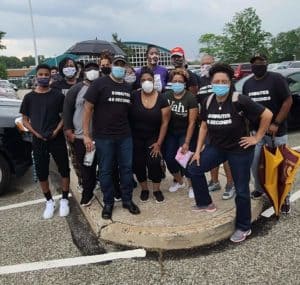In December 1865, the first step was taken.
In December 1955, a stance was made.
In August 1963, a speech was heard.
In November 2008, an election was won.
These historical moments of abolishment, refusal to move, powerful words, and presidential election all indicate strides that have been taken to reach equality for black men and women in America.
Now, during a month dedicated to celebrating these strides, there is still a need for intentional and healthy conversations.
“It’s not that we haven’t come a long way since the sixties, we haven’t come as far as we’d like to believe,” said Pastor Jerome Coleman, the pastor of First Baptist Church of Crestmont in Willow Grove, Pennsylvania.
After nearly a year of being in ministry, Coleman was called to the little church of Crestmont. He has served at First Baptist for 13 years now, and has watched God transform the building, the people, and himself.
“The Lord called us there [Crestmont]…we knew he was calling [and] the rest is history. Before the pandemic, we had grown from one service to two services, averaging about 400 people a Sunday. So, God has been really good and I’m grateful for the journey.”
Preaching at Crestmont has allowed Coleman some unique ministry opportunities, including bringing light to historic, civil rights movements – such as Juneteenth – and conversing about such topics.
“Really what we did was lift it [Juneteenth] up. We were planning on – well I was planning on – doing something a little more elaborate this year,” said Coleman.
Juneteenth, also known as Freedom Day, is the historic holiday that celebrates the emancipation of those who had been enslaved in the United States. Last year, was the first year First Baptist, as a whole, recognized the holiday. In which, Coleman took the opportunity to educate his congregation and the community about the event.
“A lot of people really didn’t know, even in our church, what it [Juneteenth] was. So, it was more of an educational thing. I kind of did a Bible Study on it and talked about it from the pulpit to start educating people,” said Coleman.
Staying on topic, Coleman also shared some of his thoughts on the current civil unrest occurring in our country.
 “It’s caused us to take a harder look at things,” he offered. “I think one of the things we need to get away from, and I will tell you as an African American and a majority of us, we hate labels. We’ve been labeled for so long…so, we need to get away from, ‘Well, you’re conservative and you’re liberal.’ No, human beings are more dynamic than that…as soon as we label, the conversation stops.”
“It’s caused us to take a harder look at things,” he offered. “I think one of the things we need to get away from, and I will tell you as an African American and a majority of us, we hate labels. We’ve been labeled for so long…so, we need to get away from, ‘Well, you’re conservative and you’re liberal.’ No, human beings are more dynamic than that…as soon as we label, the conversation stops.”
To continue these types of conversations in a healthy manner, Coleman encouraged a certain awareness of the continuity of Scripture and God.
“As Christians, I think we need to stop avoiding the continuity of Scripture. There are some [that think] now we’re New Testament, it’s just about evangelizing the lost and winning people for Jesus Christ and waiting for the chariot to swing low to take us home to glory. The continuity of Scripture suggests to us that the same God who said, ‘Take away from me your noisy worship services and your festivals because you are not taking care of the poor, you’re not taking care of the widow’….that’s the same God.”
Coleman continued: “If we believe that God is God, then the Christ of the New Testament and the God of the Old Testament are one and the same. What I mean by that is this: The God of the Old Testament is always Christ-like. So now it forces us to have those conversations if we believe in the continuity of Scripture.”
As a church, Coleman’s congregation is leaning on the continuity of Scripture by continuing their many ministries, despite a pandemic, and adopting Proverbs 3:5-6 as their theme for the year.
“They’re [the ministries] still operating as far as men and women via Zoom. We purchased about ten Zoom rooms that people can use for their ministries, and they’re doing their meetings and ministries via Zoom right now.”
These ministries including: A dance ministry, a drama ministry, a feeding ministry, youth ministry, Sunday School groups, women’s ministry, men’s ministry, a missions ministry connected with missionaries in Nigeria, and, possibly, a new food distribution ministry.
“We’re excited. We don’t know what the future holds, but we know that God’s church will always be in existence and always be relevant because it’s his church.”
Listen to the Podcast Interview:
The “50 Stories of Transformation” series, told in honor of the Baptist Resource Network’s 50th anniversary, highlights the many ways God has moved throughout Pennsylvania, South Jersey and beyond. Your generous support of the Cooperative Program makes this ministry possible and fuels evangelism and outreach in our local churches and all over the world! Thank you!